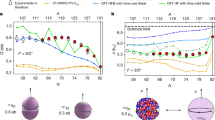Abstract
NUCLEAR magnetic resonance signals from polynucleotides of thymidine-5′-phosphate have been investigated and the terminal monoester phosphate distinguished from the diester phosphate of the chain.
This is a preview of subscription content, access via your institution
Access options
Subscribe to this journal
Receive 51 print issues and online access
$199.00 per year
only $3.90 per issue
Buy this article
- Purchase on Springer Link
- Instant access to full article PDF
Prices may be subject to local taxes which are calculated during checkout
Similar content being viewed by others
References
Khorana, H. G., and Vizsolyi, J. P., J. Amer. Chem. Soc., 83, 675 (1961).
Varian Associates Staff, NMR and EPR Spectroscopy (Pergamon Press, 1960).
The chemical shift data in this communication are defined as (H (sample)−H (reference))/(H (reference)) × 106 and are given in parts per million .
Jones, R. A. Y., and Katritzky, A. R., Angew. Chem. (Intern. ed.). 1, 32 (1962).
Cohn, M., and Hughes, T. R., J. Biol. Chem., 235, 3250 (1960).
Author information
Authors and Affiliations
Rights and permissions
About this article
Cite this article
MANDEL, M., WESTLEY, J. Nuclear Magnetic Resonance of Phosphorus in Deoxythymidine Polynucleotides. Nature 203, 301–302 (1964). https://doi.org/10.1038/203301b0
Issue Date:
DOI: https://doi.org/10.1038/203301b0
Comments
By submitting a comment you agree to abide by our Terms and Community Guidelines. If you find something abusive or that does not comply with our terms or guidelines please flag it as inappropriate.



